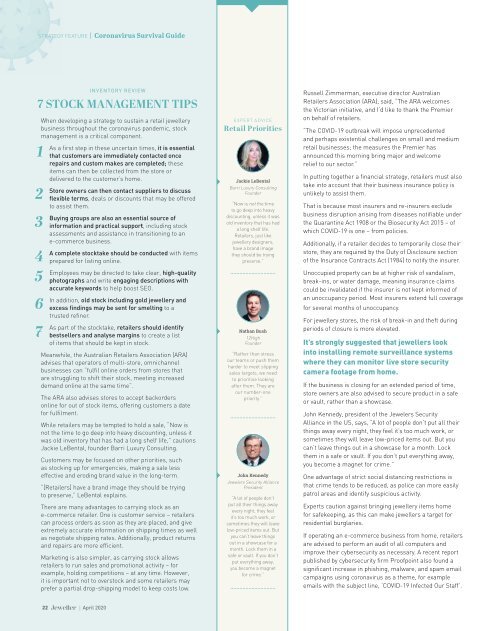Jeweller - April 2020
• Conquering Coronavirus: protect and prepare your business during the pandemic • Time frame: exploring five years of change in the watch category • Watch this space: a showcase of best-selling and new release watches
• Conquering Coronavirus: protect and prepare your business during the pandemic
• Time frame: exploring five years of change in the watch category
• Watch this space: a showcase of best-selling and new release watches
You also want an ePaper? Increase the reach of your titles
YUMPU automatically turns print PDFs into web optimized ePapers that Google loves.
STRATEGY FEATURE | Coronavirus Survival Guide<br />
INVENTORY REVIEW<br />
7 STOCK MANAGEMENT TIPS<br />
When developing a strategy to sustain a retail jewellery<br />
business throughout the coronavirus pandemic, stock<br />
management is a critical component.<br />
1<br />
2<br />
3<br />
4<br />
5<br />
6<br />
7<br />
As a first step in these uncertain times, it is essential<br />
that customers are immediately contacted once<br />
repairs and custom makes are completed; these<br />
items can then be collected from the store or<br />
delivered to the customer’s home.<br />
Store owners can then contact suppliers to discuss<br />
flexible terms, deals or discounts that may be offered<br />
to assist them.<br />
Buying groups are also an essential source of<br />
information and practical support, including stock<br />
assessments and assistance in transitioning to an<br />
e-commerce business.<br />
A complete stocktake should be conducted with items<br />
prepared for listing online.<br />
Employees may be directed to take clear, high-quality<br />
photographs and write engaging descriptions with<br />
accurate keywords to help boost SEO.<br />
In addition, old stock including gold jewellery and<br />
excess findings may be sent for smelting to a<br />
trusted refiner.<br />
As part of the stocktake, retailers should identify<br />
bestsellers and analyse margins to create a list<br />
of items that should be kept in stock.<br />
Meanwhile, the Australian Retailers Association (ARA)<br />
advises that operators of multi-store, omnichannel<br />
businesses can “fulfil online orders from stores that<br />
are struggling to shift their stock, meeting increased<br />
demand online at the same time”.<br />
The ARA also advises stores to accept backorders<br />
online for out of stock items, offering customers a date<br />
for fulfilment.<br />
While retailers may be tempted to hold a sale, “Now is<br />
not the time to go deep into heavy discounting, unless it<br />
was old inventory that has had a long shelf life,” cautions<br />
Jackie LeBental, founder Barri Luxury Consulting.<br />
Customers may be focused on other priorities, such<br />
as stocking up for emergencies, making a sale less<br />
effective and eroding brand value in the long-term.<br />
“[Retailers] have a brand image they should be trying<br />
to preserve,” LeBental explains.<br />
There are many advantages to carrying stock as an<br />
e-commerce retailer. One is customer service – retailers<br />
can process orders as soon as they are placed, and give<br />
extremely accurate information on shipping times as well<br />
as negotiate shipping rates. Additionally, product returns<br />
and repairs are more efficient.<br />
Marketing is also simpler, as carrying stock allows<br />
retailers to run sales and promotional activity – for<br />
example, holding competitions – at any time. However,<br />
it is important not to overstock and some retailers may<br />
prefer a partial drop-shipping model to keep costs low.<br />
EXPERT ADVICE<br />
Retail Priorities<br />
Jackie LeBental<br />
Barri Luxury Consulting<br />
Founder<br />
“Now is not the time<br />
to go deep into heavy<br />
discounting, unless it was<br />
old inventory that has had<br />
a long shelf life.<br />
Retailers, just like<br />
jewellery designers,<br />
have a brand image<br />
they should be trying<br />
preserve.”<br />
Nathan Bush<br />
12High<br />
Founder<br />
“Rather than stress<br />
our teams or push them<br />
harder to meet slipping<br />
sales targets, we need<br />
to prioritise looking<br />
after them. They are<br />
our number-one<br />
priority.”<br />
John Kennedy<br />
Jewelers Security Alliance<br />
President<br />
“A lot of people don’t<br />
put all their things away<br />
every night, they feel<br />
it’s too much work, or<br />
sometimes they will leave<br />
low-priced items out. But<br />
you can’t leave things<br />
out in a showcase for a<br />
month. Lock them in a<br />
safe or vault. If you don’t<br />
put everything away,<br />
you become a magnet<br />
for crime.”<br />
Russell Zimmerman, executive director Australian<br />
Retailers Association (ARA), said, “The ARA welcomes<br />
the Victorian initiative, and I’d like to thank the Premier<br />
on behalf of retailers.<br />
“The COVID-19 outbreak will impose unprecedented<br />
and perhaps existential challenges on small and medium<br />
retail businesses; the measures the Premier has<br />
announced this morning bring major and welcome<br />
relief to our sector.”<br />
In putting together a financial strategy, retailers must also<br />
take into account that their business insurance policy is<br />
unlikely to assist them.<br />
That is because most insurers and re-insurers exclude<br />
business disruption arising from diseases notifiable under<br />
the Quarantine Act 1908 or the Biosecurity Act 2015 – of<br />
which COVID-19 is one – from policies.<br />
Additionally, if a retailer decides to temporarily close their<br />
store, they are required by the Duty of Disclosure section<br />
of the Insurance Contracts Act (1984) to notify the insurer.<br />
Unoccupied property can be at higher risk of vandalism,<br />
break-ins, or water damage, meaning insurance claims<br />
could be invalidated if the insurer is not kept informed of<br />
an unoccupancy period. Most insurers extend full coverage<br />
for several months of unoccupancy.<br />
For jewellery stores, the risk of break-in and theft during<br />
periods of closure is more elevated.<br />
It’s strongly suggested that jewellers look<br />
into installing remote surveillance systems<br />
where they can monitor live store security<br />
camera footage from home.<br />
If the business is closing for an extended period of time,<br />
store owners are also advised to secure product in a safe<br />
or vault, rather than a showcase.<br />
John Kennedy, president of the Jewelers Security<br />
Alliance in the US, says, “A lot of people don’t put all their<br />
things away every night, they feel it’s too much work, or<br />
sometimes they will leave low-priced items out. But you<br />
can’t leave things out in a showcase for a month. Lock<br />
them in a safe or vault. If you don’t put everything away,<br />
you become a magnet for crime.”<br />
One advantage of strict social distancing restrictions is<br />
that crime tends to be reduced, as police can more easily<br />
patrol areas and identify suspicious activity.<br />
Experts caution against bringing jewellery items home<br />
for safekeeping, as this can make jewellers a target for<br />
residential burglaries.<br />
If operating an e-commerce business from home, retailers<br />
are advised to perform an audit of all computers and<br />
improve their cybersecurity as necessary. A recent report<br />
published by cybersecurity firm Proofpoint also found a<br />
significant increase in phishing, malware, and spam email<br />
campaigns using coronavirus as a theme, for example<br />
emails with the subject line, ‘COVID-19 Infected Our Staff’.<br />
22 | <strong>April</strong> <strong>2020</strong>


















